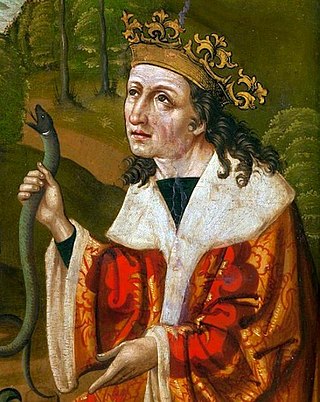Top Qs
Timeline
Chat
Perspective
Alexander Jagiellon
Grand Duke of Lithuania (1492–1506) and King of Poland (1501–1506) From Wikipedia, the free encyclopedia
Remove ads
Alexander Jagiellon (Polish: Aleksander Jagiellończyk; Lithuanian: Aleksandras Jogailaitis; 5 August 1461 – 19 August 1506) was Grand Duke of Lithuania from 1492 and King of Poland from 1501 until his death in 1506.[2] He was the fourth son of Casimir IV and a member of the Jagiellonian dynasty. Alexander was elected grand duke of Lithuania upon the death of his father and became king of Poland upon the death of his elder brother John I Albert.
Remove ads
Early life
Alexander was born as the fourth son of King Casimir IV Jagiellon and Elizabeth of Austria, daughter of the King Albert II of Germany. At the time of his father's death in 1492, his eldest brother Vladislaus had already become king of Bohemia (1471) and Hungary and Croatia (1490), and the next oldest brother, Saint Casimir, had died (1484) after leading an ascetic and pious life in his final years, resulting in his eventual canonization. While the third oldest brother, John I Albert was chosen by the Polish nobility (szlachta) to be the next king of Poland, the Lithuanians instead elected Alexander to be their next grand duke. Alexander maintained a Lithuanian court and multiple Lithuanian priests served in his royal chapel of the Polish royal court.[3][4][5]
Remove ads
Grand Duke of Lithuania (1492–1506)
Summarize
Perspective
The greatest challenge that Alexander faced upon assuming control of the grand duchy was an attack on Lithuania by Grand Duke Ivan III of Russia and his allies, the Crimean Khanate's Tatars, which commenced shortly after his accession. Ivan III considered himself the heir to the lands of Kievan Rus', and was striving to take back the territory previously gained by Lithuania.[6] Unable to successfully stop the incursions, Alexander sent a delegation to Moscow to make a peace settlement, which was signed in 1494 and ceded extensive land over to Ivan. In an additional effort to instill a peace between the two countries, Alexander was betrothed to Helena, the daughter of Ivan III; they were married in Vilnius on 15 February 1495. The peace did not last long, however, as Ivan III resumed hostilities in 1500. The most Alexander could do was to garrison Smolensk and other strongholds and employ his wife Helena to mediate another truce between him and her father after the disastrous Battle of Vedrosha (1500). In the terms of this truce, which was concluded on 25 March 1503, Lithuania had to surrender about a third of its territory to the nascent expansionist Russian state; Alexander pledged not to touch lands including Moscow, Novgorod, Ryazan, and others, while a total of 19 cities were ceded.[7] Historian Edvardas Gudavičius said:
"The war of 1492–1494 was a kind of reconnaissance mission conducted by the united Russia. [The terms of] the ceasefire of 1503 showed the planned political aggression of Russia, its undoubted military superiority. The concept of the sovereign of all Russia, put forward by Ivan III, did not leave room for the existence of the Lithuanian state".[7]
Also King of Poland (1501–1506)
On 17 June 1501, Alexander's older brother John I Albert died suddenly, and Alexander was crowned king of Poland on 12 December of that year. Alexander's shortage of funds immediately made him subservient to the Polish Senate and szlachta, who deprived him of control of the mint (then one of the most lucrative sources of revenue for the Polish kings), curtailed his prerogatives, and generally endeavored to reduce him to a subordinate position. In 1505, the Sejm of the Kingdom of Poland passed the Act of Nihil novi, which forbade the king to issue laws without the consent of the nobility, represented by the two legislative chambers, except for laws governing royal cities, crown lands, mines, fiefdoms, royal peasants, and Jews. This was another step in Poland's progression towards a "Noble's Democracy".
During Alexander's reign, Poland suffered additional humiliation at the hands of her subject principality, Moldavia. Only the death of Stephen, the great hospodar of Moldavia, enabled Poland still to hold her own on the Danube river. Meanwhile, the liberality of Pope Julius II, who issued no fewer than 29 bulls in favor of Poland and granted Alexander Peter's Pence and other financial help, enabled him to restrain somewhat the arrogance of the Teutonic Order.
Alexander Jagiellon never felt at home in Poland, and bestowed his favor principally upon his fellow Lithuanians, the most notable of whom was the wealthy Lithuanian magnate Michael Glinski, who justified his master's confidence by his great victory over the Tatars at Kletsk (5 August 1506), news of which was brought to Alexander on his deathbed in Vilnius.
According to Giedrė Mickūnaitė, interwar Lithuanian historians assumed that Alexander was the last ruler of the Gediminid dynasty who understood the Lithuanian language, yet did not speak it, but there is a lack of sources regarding that.[8]
In 1931, during the refurbishment of Vilnius Cathedral, the forgotten sarcophagus of Alexander was discovered, and has since been put on display.
Remove ads
Gallery
- King Alexander in Polish Senate, 1506.
- Crown and sword of Alexander Jagiellon
- Seal of Alexander Jagiellon, 1504
- Fantasy portrait by Bacciarelli
- Coat of arms
- Sword of Alexander Jagiellon in 2023
See also
References
Sources
External links
Wikiwand - on
Seamless Wikipedia browsing. On steroids.
Remove ads











